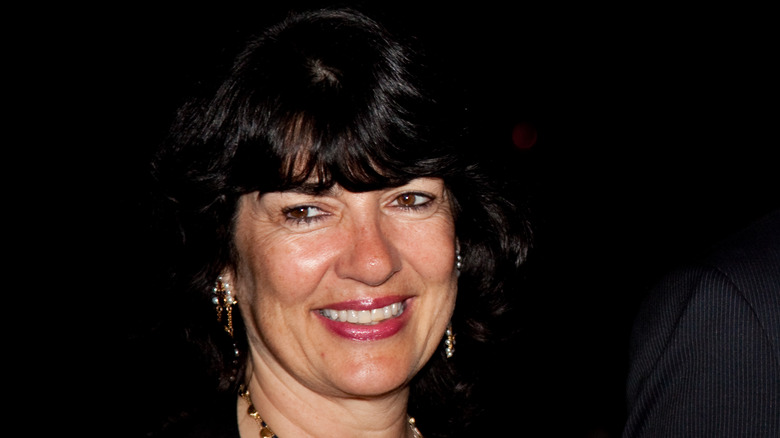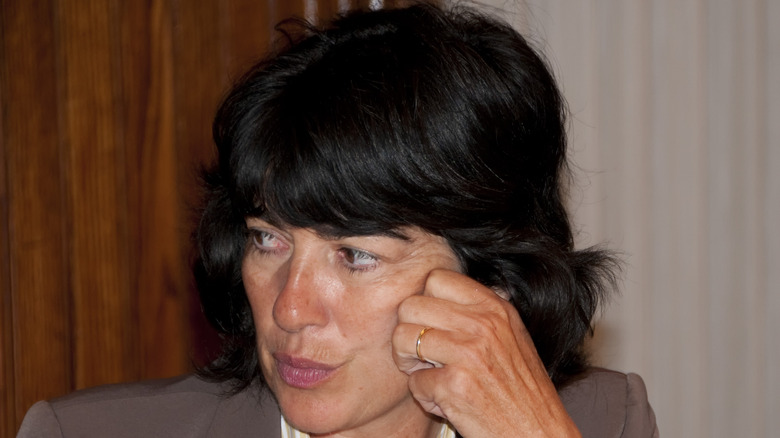CNN Anchor Christiane Amanpour's Cancer Diagnosis Explained
It's not often that people get a glimpse into the lives of the journalists who help bring us our news everyday. When we do, those glimpses are usually of happy events. Awards, achievements, marriages, or additions to their families that take them out of the newsrooms for a little while, or give them a new perspective on the information they report on.
Today, however, CNN's chief internal anchor, Christiane Amanpour, allowed viewers a different kind of personal insight. In a video released through CNN, Amanpour revealed that she has ovarian cancer. Amanpour begins her video by thanking the members of her reporting team who "held down the fort" over the last few weeks. She reveals that she has been absent from her usual duties because she has been diagnosed with ovarian cancer.
It's a diagnosis that, as Amanpour points out, is not uncommon. The American Cancer Society reports that ovarian cancer is the 18th most common form of cancer worldwide and that it is the fifth most deadly form of cancer among women, far more than any other reproductive cancer. One in 78 women will develop this specific form of cancer, which will prove fatal for 1 in 108 women. The American Cancer Society also states that the rate has been dropping for the last 20 years, in part due to better screenings and diagnostic tools.
Diagnosing ovarian cancer
Although diagnostic tools and screening procedures have improved in the last few decades, it is important to note that they are not perfect and ovarian cancer often goes undetected. This is in part due to the position of the ovaries, according to the National Ovarian Cancer Coalition. The ovaries are small and almond-shaped, tucked back deep within a woman's abdomen.
They can sometimes be checked through pelvic exams, according to the Mayo Clinic. This is an exam in which the doctor uses a gloved hand to probe a woman's vagina while their other hand presses on her stomach, allowing the doctor to feel the general size and placement of the woman's reproductive organs. It's a common part of Pap exams, but the CDC warns that Pap exams are not meant to test for ovarian cancer.
There are other diagnostic options which are usually more accurate. The Mayo Clinic tells us that these include CT scans, ovarian ultrasounds, or panels of blood tests to look for signs that the body is fighting an internal infection. Before a doctor will order such tests, however, a woman usually has to notice a specific grouping of symptoms. These include bloating, pain during sex, difficulty eating or a sensation of being full after only a little food, or frequent urination. Symptoms can also include constipation, stomach troubles, back pain, pelvic or abdominal pain, heartburn, fatigue, or changes to her menstrual cycle (via the National Ovarian Cancer Coalition).
Treatment options
If a woman experiences any of these symptoms clustered together, she may want to consult her doctor . This is especially true if she experiences them for two or more weeks during which conventional medications don't alleviate the symptoms like they should. At that point most doctors should order further diagnostic testing to either prove or rule out the presence of ovarian cancer.
Once a woman receives her diagnosis, there are several treatment options. The Mayo Clinic states that surgery is usually the first line of treatment, an experience Amanpour shares. In her video she said that she had undergone "very successful major surgery" to remove her cancer. Depending on the severity of the cancer, a woman may have one or both ovaries removed. If the cancer has spread or if the woman prefers, she may also have her fallopian tubes, uterus, closely connected lymph nodes, and a specific fold of fatty tissue removed as well.
Chemotherapy often follows surgery, as in Amanpour's case. Chemotherapy is either an IV or oral medication intended to kill any remaining cancer cells in order to prevent a relapse.
A third treatment option is targeted treatment. It is usually only applied after the first two options prove unsuccessful, or if a woman's cancer returns after remission. This is because targeted treatment is a relatively new field with ongoing research into its full range of use and long-term efficacy, so doctors tend to rely on more time-tested methods until further studies are complete.
Prevention and risk factors
In her video, Amanpour states that she is lucky to have the British NHS as well as the insurance provided through her job, which provides her with the medical care she needs. She is well aware that this coverage is not available to all women, however. And to that end she encourages all women to listen to their bodies. A woman who cannot go in for regular screenings may still catch ovarian cancer early if she notices her symptoms and seeks what medical help is available.
The CDC, it seems, seconds that call. According to their website, there is no known effective prevention against ovarian cancer. Some studies indicate the giving birth, breastfeeding for at least one year, using birth control pills for five years, or having her tubes tied might reduce a woman's risk of developing ovarian cancer, but researchers are still stumped as to why.
Similarly, the CDC lists a few risk factors, but so much is still not known about ovarian cancer that researchers aren't sure how much impact these factors actually have. They include being middle-aged or older, having endometriosis or struggling with fertility, never having children, and having close relatives with ovarian cancer. Women with a previous history of breast, uterine, or colorectal cancer are also at higher risk for ovarian cancer. And current demographic trends indicate that Eastern European women or women of Ashkenazi Jewish heritage may also be at a greater risk.
The dangers of medical bias
While much about ovarian cancer remains a mystery, however, it is well known why conditions affecting women are often less understood than conditions that affect men. It is the same reason that Amanpour urges women not only to listen to their bodies but to ensure that their concerns are not brushed aside or downplayed.
Cedars-Sinai Hospital reports that women who go to the ER while suffering a heart attack are more likely to die than men who go to the same ER with the same affliction. Their report also points out the fact that women are more likely than men to suffer autoimmune disorders — the report specifically names lupus — but doctors have no idea why.
This might seem like an oddly specific blank spot to be concerned about. But researchers at Duke point out, the medical community as a whole is behind when it comes to women's health. They highlight that, until relatively recently, women were excluded from clinical trials, especially women of an age to bear children. Researchers were more afraid of the effects on potential pregnancies than the lack of information on women. They also weren't sure they could account for a woman's "fluctuating hormones," further alienating women from consensual medical research.
Amanpour's advice
Women now comprise half of the participants in most clinical trials. But as Duke also points out, half of all women feel that they are discriminated against by their doctors, while one in five feel that their concerns are dismissed or their symptoms downplayed because they are women. There is a stereotypical expectation that women exaggerate their illnesses. When that expectation is carried into the exam room, women suffer.
As Christiane Amanpour says, women need to listen to their bodies and stand firm when they feel something is wrong. This is true in all things, but especially when it comes to something like ovarian cancer. The symptoms, when they present, can easily be written off as other things. But when they happen together or when conventional treatments fail, it is time to get additional testing.
In Amanpour's case she stood firm. As she puts it, she has "the very best possible long-term prognosis" with the combined use of surgery and chemotherapy. Not all women will be so lucky. The American Cancer Society predicts that 2021 will see 21,410 women diagnosed with new cases of ovarian cancer, while a total of 13,770 women will die as a result of it. Not all of those deaths are preventable. But some may be avoided by women who listen to their bodies and stand firm in the exam room. And by doctors who listen to their patients as they are, not as they are expected to be.






